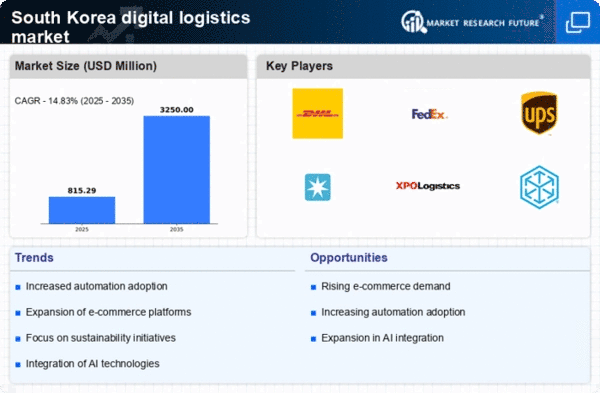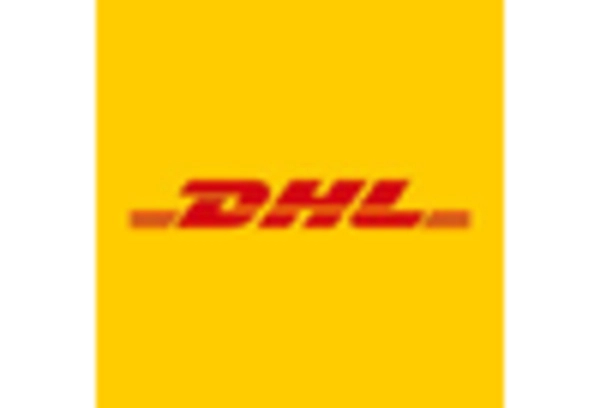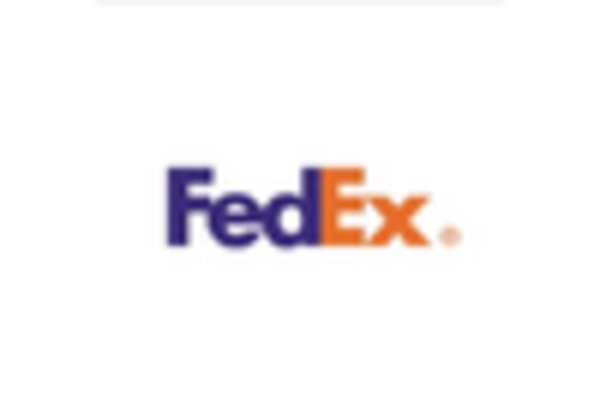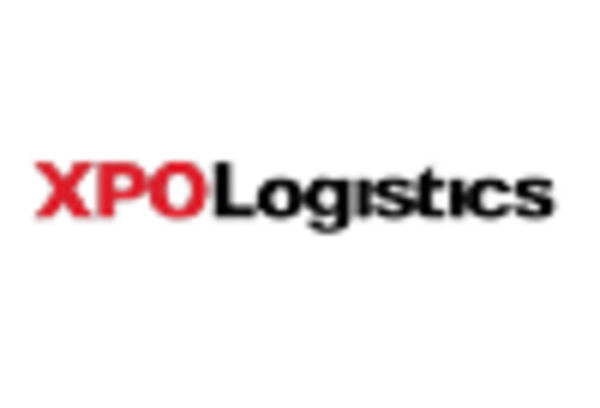Technological Advancements in Logistics
The digital logistics market in South Korea is experiencing a surge due to rapid technological advancements. Innovations such as artificial intelligence (AI), machine learning, and the Internet of Things (IoT) are transforming logistics operations. These technologies enhance efficiency, reduce costs, and improve service delivery. For instance, AI-driven predictive analytics can optimize supply chain management, leading to a potential reduction in operational costs by up to 20%. Furthermore, the integration of IoT devices allows for real-time tracking of shipments, which is increasingly demanded by consumers. As a result, logistics companies are investing heavily in these technologies to remain competitive in the digital logistics market.
E-commerce Growth and Consumer Expectations
The digital logistics market is significantly influenced by the growth of e-commerce in South Korea. With online retail sales projected to reach approximately $100 billion by 2025, logistics providers are under pressure to meet heightened consumer expectations for fast and reliable delivery. This shift necessitates the adoption of advanced logistics solutions, including last-mile delivery innovations and automated warehousing systems. Companies are increasingly focusing on enhancing their logistics capabilities to ensure timely deliveries, which is crucial for customer satisfaction. The demand for same-day and next-day delivery options is reshaping the logistics landscape, compelling businesses to adapt swiftly to these evolving consumer preferences.
Rising Demand for Supply Chain Transparency
In the digital logistics market, there is a growing demand for supply chain transparency among consumers and businesses alike. Stakeholders are increasingly seeking visibility into the logistics process, from production to delivery. This trend is driven by the need for accountability and trust in the supply chain. Companies that provide real-time tracking and transparent communication are likely to gain a competitive edge. The implementation of blockchain technology is emerging as a solution to enhance transparency and security in logistics transactions. As businesses strive to meet these transparency demands, the digital logistics market is expected to evolve, with more companies adopting innovative solutions to provide visibility.
Sustainability and Green Logistics Practices
Sustainability is becoming a crucial driver in the digital logistics market as companies strive to reduce their environmental impact. In South Korea, there is a notable shift towards green logistics practices, including the use of electric vehicles and eco-friendly packaging. This trend is not only driven by regulatory pressures but also by consumer preferences for sustainable products and services. Companies that adopt sustainable practices may enhance their brand image and attract environmentally conscious consumers. The digital logistics market is likely to see an increase in investments aimed at developing sustainable logistics solutions, which could lead to a more eco-friendly logistics ecosystem.
Government Support and Infrastructure Development
Government initiatives play a pivotal role in shaping the digital logistics market in South Korea. The government has been actively investing in logistics infrastructure, including smart logistics centers and transportation networks. These investments aim to enhance the efficiency of logistics operations and support the digital transformation of the sector. For example, the South Korean government allocated approximately $1 billion for logistics infrastructure development in 2025. Such support not only facilitates the growth of logistics companies but also encourages the adoption of digital technologies. As a result, the digital logistics market is likely to benefit from improved infrastructure and streamlined operations.

















